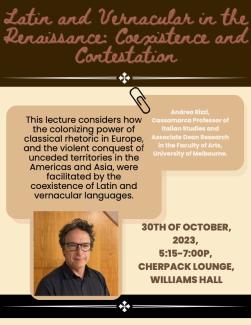Event

The myth of the orator as a colonizing figure served to promote the studia humanitatis as a commitment capable of fostering a successful career for teachers and writers, leaders and officials, preachers, diplomats, and translators, but also as an overtly coercive and colonizing means at the disposal of Renaissance rulers. As such, and especially through reference to examples pertaining to fifteenth-century Italy and colonial Mexico in the sixteenth century, this paper considers how the colonizing power of classical rhetoric in Europe, and the violent conquest of unceded territories in the Americas and Asia, were facilitated by the coexistence of Latin and vernacular languages; the relations between their rhetorics. The same condition of coexistence and interaction was also variously recognized as a significant means of resistance and contestation.
Andrea Rizzi is Cassamarca Professor of Italian Studies and Associate Dean Research in the Faculty of Arts at the University of Melbourne. A literary and translation historian, he has published widely on the cultural and political role of literary translators, and on trust and communication in early modern Italy. His most recently book is What is Translation History? A Trust-based Approach (Palgrave 2019, with co-authors Anthony Pym and Birgit Lang). He was an Australian Research Council Future Fellow (2015-2019) and Villa I Tatti Harvard Center for Italian Renaissance Studies Fellow (2010-2011).
